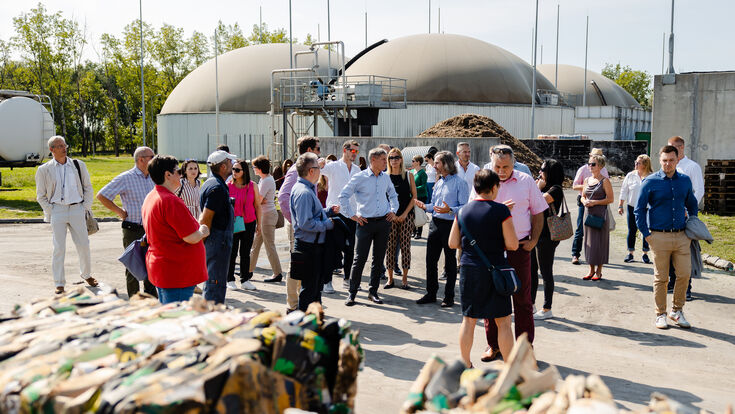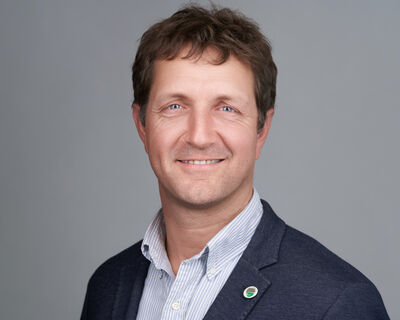Sustainability Expo in Budapest : „We want Environtec to be a knowledge-sharing hub“

It's the first time Environtec takes place. How did the event come about?
We were approached by HUNGEXPO Budapest Congress and Exhibition Center, Hungary’s and the region’s traditional and leading exhibition and conference organiser and Michael Pittscheidt German trade fair organiser with the idea to launch a new B2B focused, green industry expo in the region. We were super excited about the idea, so we joined forces to create a unique, colourful and professional event.
Our association, the Hungarian Association of Environmental Enterprises is 32 years old and the biggest environmental umbrella organisation here in Hungary. We already organised six ÖKOINDUSTRIA expos in the past, which was a national-level event. With being key partner of this trio of organisers, we are aiming to create an extensive and internationally recognised professional event.
Follow Environtec on LinkedIn!
What are Environtec's main objectives?
Hungary is right in the middle of Europe. It's a meeting point for Central Eastern Europe, the West Balkan and the Southeast Europe region. We are moderating and transferring information and technology between Western Europe and Eastern as well as Southern Europe. So Environtec serves as a meeting point for the EU and accession countries as well as our partners. The Hungarian Association of Environmental Enterprises has a lot of international projects and partners. For us, it's also a good opportunity to invite everybody to Budapest.
What are some key highlights of Environtec that attendees can expect to see?
First of all the well-known Remediation and Brownfield Management Conference will take place in the framework of Environtec. The accession countries are preparing their first databases about the remediation needs of industrial sites. We can share best practices in that field as well as relevant EU directives. There will be great speakers like Bavo Peeters, EU Policy officer soil protection and sustainable land use, Elena Stefanoni from UNEP and Dietmar Müller-Grabherr, General Secretary, EU Common Forum on Contaminated Land. We will host a second international conference: The ISWA Conference on Circular Economy. ISWA Vice-President Arne Ragossnig and Katarina Svatikova, Policy Analyst Circular Economy at OECD are just two of many experts, who will speak at there.

Why should readers join Environtec this October?
It's going to be a very colourful expo. Exhibitors from a variety of areas like remediation, air quality, water retention, smart cities, green logistics and green mobilization as well as of course recycling and wastewater treatment are coming to Budapest. What is really important is awareness raising. So we will show a few educational best practices and awareness-raising best practices from the region. There will be three different stages with simultaneous presentations and speeches. And the international conferences will of course take place in special conference rooms.
We also provide a B2B platform where everybody can organise B2B meetings online. You just have to register first.
You said you expanded ÖKOINDUSTRIA to be a bigger and more international event. What are your hopes and ambitions for the future?
Cooperation is the key element that is still missing when talking about circular economy, climate change or industrial symbiosis. For businesses, it's really hard to share information and experiences and cooperate in tenders. So our plan is to enhance cooperation in the region and help the West Balkans region to clean up their soil and air. We would like to show a direction in the transition to a circular economy. And I think Hungary has a good opportunity to do this because, as I said, we are we are in the middle of Europe - both geographically and when looking at the the stats. We are learning a lot from Western Europe and sharing technology with Eastern Europe. We want Environtec to be a knowledge-sharing hub.
Will Environtec take place every year?
No, it will be a biannual event because every other year Hungary is organising the Planet Budapest Exhibition that takes place at HUNGEXPO Budapest Congress and Exhibition Center as a venue, which is a huge summit for sustainable development but mostly B2C. Environtec is more B2B. But we would like to cover everybody, the decision-makers, the inhabitants, students, universities, and laboratories.
Sustainability is at the core of this event. How does the organisation, and the location implement this principle?
Some of the speakers will be participating online so we can spare some CO2 footprint. The pavilions are refurbished. The expo site is quite energy efficient and is buying green energy. The booth materials are reusable and it's possible to have the stand and booth made from cardboard.
There is separate waste collection and the participants can even join a tour and see how the baling and the sorting is done right there on the premises.
Regarding the catering, no single-use plastics will be used during the exhibition.

What are the biggest challenges that the industry has to face today?
I think the biggest challenge is how we can make prevention and reuse measurable. It's on top of the waste hierarchy. It's the priority, but we cannot measure it. Which is ironic and challenging.
The other one is: how we can ensure a competitive advantage for recyclables, used materials or refillable and repairable products. That's green procurement. And we need green procurement. But recycled plastic granulate is still more expensive than virgin material. It’s not only important to ensure this competitive advantage, we have to raise the quality of the recycled product as well. So we need better separation, mono-material packaging and products. And, of course, repairable products.
A lot of this has to happen before the material even ends up in a recycling plant.
Yes, that's all prevention. Looking at the eastern market, Ukraine, Romania, Serbia, North Macedonia, and Bulgaria, if they climb the same life cycle that we did it is just too much. Too much time and material. They have to focus on prevention. Use less materials, less diversity in packaging, and provide repairable products. So that at the end of the day, they have to deal with less waste. We have huge landfilling and river pollution problems in the Balkan region. Hungary is receiving thousands of tonnes of waste through the rivers. And it costs Hungary millions of euros each year to clean up our rivers and floodplain forests, which are the biggest and most precious resources.
Cooperation is the key element that is still missing when we are talking about circular economy, climate change or industrial symbiosis.Gergely Hankó
What does the waste and resources management industry have to do?
Awareness-raising and education are a must. Also, most of the countries don't have stable budgets for waste management. So we need the strategy and after that, we can start fine-tuning the separate waste collection and the advocacy for the companies. How they can use fewer materials in their products and packaging. Eco-design can help a lot with waste management as well. But in the region, the story is about landfills. In Hungary, we remediated most of the landfills and now they are EU compatible. But in the neighbouring countries, they still have hundreds and thousands of landfills without environmental protection. So everything is landing up in our rivers, soils, the groundwater and air. ISWA is fortunately publishing a lot of studies and reports on how to tackle all those problems like waste burning, open dumpsites, and river pollution. And hopefully, we can show the neighbouring countries how they can remediate these landfills.
Do you feel that the neighbouring countries are open to changing their waste management systems?
They have to change. They have to meet the EU standards like introducing EPR and DRS systems, lowering landfill rates, implementing recycling and reusable solutions and developing circular economy business models. They have to act fast. Because the EU taxonomy, the ESG, EPR and all the three letters are coming, and on top of that the four-letter words like CSDDD. It's a one-way road and we are counting on them to cooperate and do it together.
About: Gergely Hankó is an economist and conservation engineer and the managing director of the Hungarian Association of Environmental Enterprises (HAEE), Vice President of the National Member of the International Solid Waste Association (ISWA) and the project manager of Plastic Cup. He has been working in environmental protection and sustainability for 18 years. He was awarded the Herman Ottó Innovator Award as well as the Commemorative Plaque for Our Environment. He is a 2-time TEDx speaker and was selected among Hungary's 25 most influential green experts. His most important area of expertise is eradicating riverine waste pollution in the Danube Basin.
In cooperation with Environtec
Professional Reading
Green Economy 2023/24 study book in collaboration with 65 leading green industry professionals. This publication is a 220-page status summary on the Hungarian environmental sector reflecting on international trends as well. It is a guide for business leaders, organisations and sustainability professionals, who can use the publication as a compass in their daily work.
Policy Guidance of Tackling Riverine Plastic Pollution in the Danube River Basin provides a comprehensive overview of the relevant sector-specific legislation, and describes the institutional structure of each country and the mechanisms related to pollution. The objective of the study is to provide citizens, researchers, and decision-makers with recommendations for universally applicable best practices grounded in proven methodologies.

